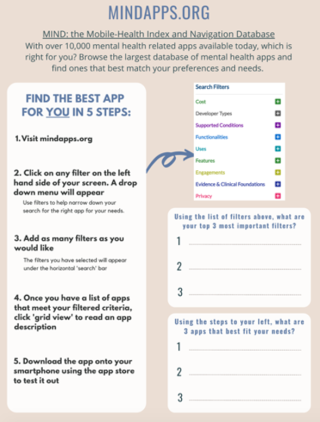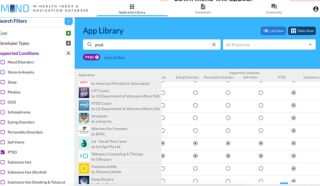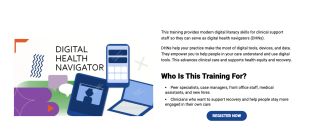Online Therapy
Tips and Tricks (to Avoid) When Selecting Mental Health Apps
How can you find the best app match for each person while avoiding paying?
Posted November 14, 2023 Reviewed by Ray Parker

Even if you are not asking, your patients are thinking about apps. Recent 2023 research suggests that nearly 50 percent of patients have tried a mental health app before, and up to 75 percent are interested in apps.
However, that interest is contingent on their therapist helping recommend appropriate apps [1]. Selecting apps is often rated as one challenge clinicians feel least prepared for. Here are three pitfalls and tips for recommending mental health apps.
Trick 1: Paying money to expensive app library databases or using websites that promise to find you the "best" app. Simply put, there are excellent free resources like mindapps.org, and any website promising to score or rank apps is making promises it cannot keep. The best app for one person will not be the same for another.
Tip 1: With thousands of mental health apps accessible today, you and your patient have many options. The best way to explore those options is to consider what features you want in an app.
What should the privacy policy be? What about the cost? What type of engagement features do you want? Our team works on the needs first and then enters them into mindapps.org to see which apps may match the current needs.
Trick 2: The best app with the most reviewers, stars, or downloads. These are all popularity metrics, and research has repeatedly shown that more popular mental health apps are not necessarily safer or better [2]. They are just easier to find.
Tip 2: We educate patients about the app landscape and why popularity metrics may be useless. To show the point, we often do an interactive exercise with mindapps.org, looking at mindfulness apps and changing the filters to see which have optimal privacy, cost, and evidence features. This example takes about 30 seconds, and the results are informative in that we often find high-quality and completely free apps for patients by looking a little deeper.

Trick 3: Most apps, even if downloaded onto the phone, never get used more than a few times [3]. Even with the most well-designed app, engagement is challenging and should not be expected. So, if you offer patients a list of apps, don't expect many results.
Tip 3: If you are going to recommend apps, you want to make sure you follow up with them at the next visit. Let the patient know you want to see what they did or learned from the app. Perhaps there is a way to add the app to your treatment or care plan?
Anything that lets you show you care about engagement and want to see the results will go a long way to driving success with any app you pick.

If you have a busy service or don't have the time to assess what app features a patient may need, search for them in a free database like mindapp.org or follow up with their use. You don't need to worry. Consider adding a digital navigator to your care team.
The digital navigator is a new non-clinical person who can help patients gain access to smartphones and Wi-Fi, help match them to apps, and even help drive engagement.
With the right strategies and tools, you can make apps work for you and your patients. If you have more tips you would like to share, please do reach out.
References
1-Berkout OV, Sunal Z. Attitudes Towards Digital Mental Health Among Individuals With Unmet Mental Health Needs. Journal of Technology in Behavioral Science. 2023 Jul 19:1-9.
2-Camacho E, Cohen A, Torous J. Assessment of Mental Health Services Available Through Smartphone Apps. JAMA Network Open. 2022 Dec 1;5(12):e2248784-.
3-Baumel A, Muench F, Edan S, Kane JM. Objective user engagement with mental health apps: systematic search and panel-based usage analysis. Journal of medical Internet research. 2019 Sep 25;21(9):e14567.


